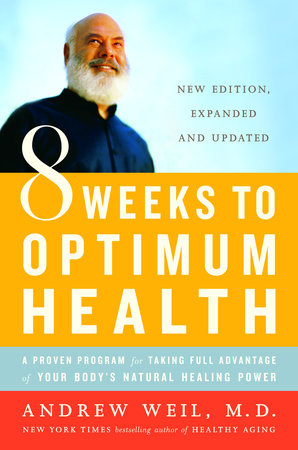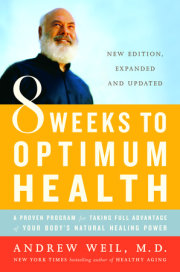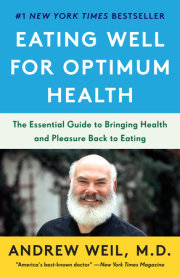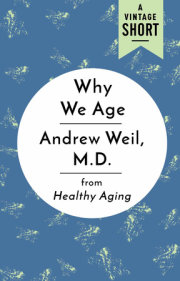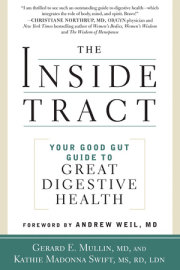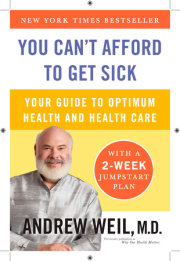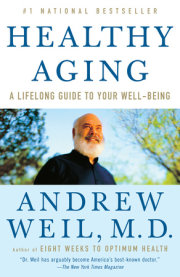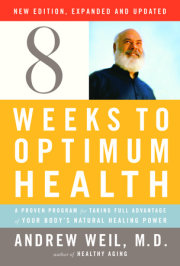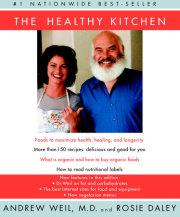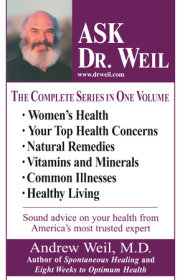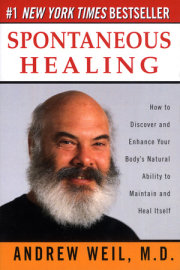1
PEOPLE CAN CHANGE
You have in your hands a tool for changing your life, an Eight-Week Program for improving health and gaining access to the power of spontaneous healing in your body. I will guide you through this program step by step, explaining the changes I will ask you to make in how you eat, how you exercise, how you breathe, and how you use your mind. I will recommend vitamins, minerals, and herbs you can use to protect your body’s healing system, and I will give you ideas about how you can change long-standing patterns of behavior that impair optimal health.
Maybe you have picked up this book because you want to have more energy. Maybe you want to lose some weight. Maybe you worry about getting older and developing diseases that disabled your parents. Perhaps you travel frequently and find it hard to maintain a healthy lifestyle on the road. Or perhaps you have a chronic illness, minor or major, and want to be less dependent on pharmaceutical drugs. Regardless of the specific nature of your need or concern, the information I have assembled in these pages will help you draw on your body’s own resources for natural healing.
The Eight-Week Program consists of small steps that build on each other until, by the time you complete it, you have laid the foundation for healthy living. You can then decide how much of the program you want to maintain on a permanent basis. I assume that you want to make changes in your life—otherwise you wouldn’t be reading this book. I see my job as pointing you in the right direction. I have no doubt that you can change, because I know from my own experience that people can do so if they really want to.
In moving files recently, I came across a yellowed clipping from The New York Times of August 12, 1971, with the headline: “Meat-Eating 230-Pound Doctor Is Now 175-Pound Vegetarian.” The article was the featured story in the Food–Fashions–Family Furnishings section of that day’s paper and carried the byline of Raymond A. Sokolov, then a Times food writer. It concerns a twenty-nine-year-old physician in rural Virginia who gave up animal foods except for dairy products, with a resultant increase in energy, well-being, and overall health. There is a photograph of the doctor in his kitchen preparing fresh corn. He has a full black beard, is wearing blue jeans and a work shirt, and looks content. Next to the picture is his recipe for a rich corn soup containing milk and butter, and another recipe for a barley-and-vegetable casserole that calls for a quarter-cup of peanut oil. According to the article, the doctor’s interest in consciousness led him to experiment with yoga and meditation, and “since yoga calls for a vegetarian diet, he gave up meat ‘in order to really do it right.’ He has been vegetarian ever since, to the amazement of his friends, who remember him as a voracious meat eater and a fat person while at Harvard.… In one year on his new diet [he] has reduced [his weight] from 230 to 175 pounds. His recurring colds and allergies have vanished.”
My beard is no longer black, and I have not been able to maintain my weight at 175 pounds. I am still mostly vegetarian (I have eaten fish for the past twenty years), though now I don’t make rich soups with milk and butter, use oil in such quantities, or ever cook with peanut oil. I think I am wiser with age and in general feel much happier now than I did when I was twenty-nine.
That was a watershed year for me. I had quit a frustrating job with the National Institute of Mental Health in July 1970, dropped out of professional medicine to write my first book, and made a great many changes in my way of living besides giving up meat. For the first time ever, I lived alone in a natural setting well away from a city. I had no office to go to, no obligations to meet. I began each morning with sitting meditation for as long as I could tolerate, which was not much in those days. I took long walks in the woods, practiced yoga postures in the afternoons, wrote, and read on a variety of subjects that interested me, from Native American shamanism to mushrooms and other wild foods. By August 1971, I was nearing another transition. The New York Times article noted, “Dr. Weil will be traveling to the Amazon jungle this fall for an extended visit to some primitive tribes on a fellowship from the Institute of Current World Affairs, a New York foundation.”
I held that fellowship from 1971 to 1975 and have written elsewhere about those travels. In another book, Spontaneous Healing, I describe seeking out a shaman in Colombia during that period and explain that my studies of ethnobotany and medicine at Harvard made me want to see the rain forest, meet native healers, and try to understand the source of healing. Mostly I wanted to learn how to help people get well and stay well without using so many of the invasive and suppressive methods of conventional medicine, and I thought the knowledge I needed was to be found in remote mountains and jungles, far from classrooms and clinics. My plan was to go to southern Mexico to learn Spanish, then to make my way down to Colombia, Ecuador, and Peru to live with Indians and learn their ways with plants and healing.
I knew this journey would be demanding, and when I first settled on the idea, I was in no way prepared, either physically or mentally, to undertake such an adventure. I had grown up in a row house in Philadelphia with little opportunity to spend time in nature, let alone in wilderness. On leaving Philadelphia, I attended college and medical school in Boston, then completed a medical internship in San Francisco—more urban, indoor experience. I was not very comfortable out-of-doors, being nervous about insects and wary of the sun, since I had fair skin that never tanned, only burned; I accepted this as an inherited trait that could never disappear. Although I was able to concentrate enough to handle schoolwork easily, I was restless, very susceptible to boredom, and I craved distraction. I was largely sedentary, hating exercise, and since I also liked to eat, I was overweight. My diet was free form and thoughtless. I ate anything and everything in large quantities, including very high-fat foods. I was a frequent consumer of alcohol and Coca-Cola.
Though I had no significant health problems, I knew from the way I huffed and puffed climbing stairs that I was not in good cardiovascular condition. I suffered from intense pollen allergies, mostly in the summer, and also had allergic reactions to a number of medications and some foods. Sometimes I would get hives for no apparent reason. On occasion I got bad migraines.
So it was clear that I was going to have to change in order to set out by myself for unknown lands and peoples in the Andes and the Amazon basin. Many of my friends could not imagine my doing any such thing, but I was determined to do so, because I believed it was the only way for me to become a true physician, one who could work with the healing power of nature. When I think back on all the changes I made in the year before I left the United States, I do not remember their being hard, even though I had to give up lifelong habits and adopt new ways of being. My memories of that year are of much fun and discovery along with a gratifying sense of accomplishment. When I look at before and after pictures of myself, I am amazed at the difference. Not only did I lose weight and grow a beard, I became aware of my strength and flexibility, got much more comfortable with myself and nature, and even, miraculously, was able to stay out in the sun and tan for the first time in my life. My allergies and headaches disappeared. By the time I got to southern Mexico, I was feeling better than I ever had in my life, full of energy, ready to plunge into unknown waters.
Copyright © 2013 by Andrew Weil, M.D.. All rights reserved. No part of this excerpt may be reproduced or reprinted without permission in writing from the publisher.

